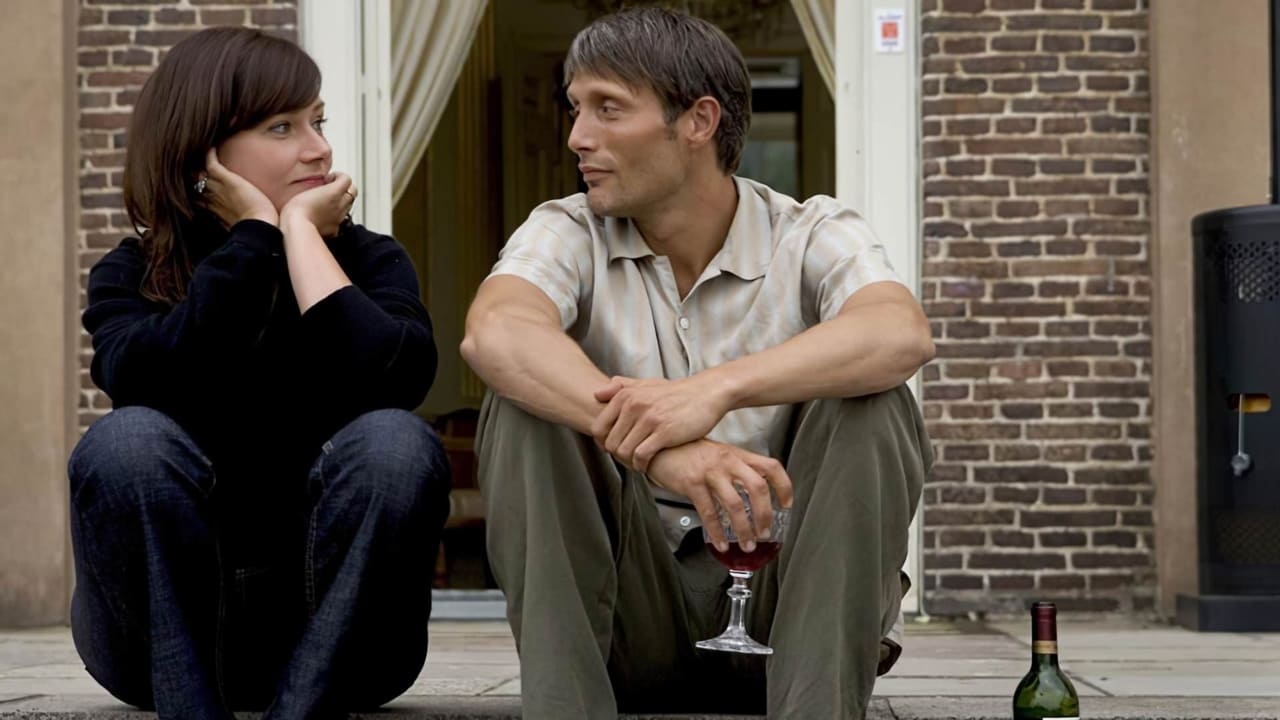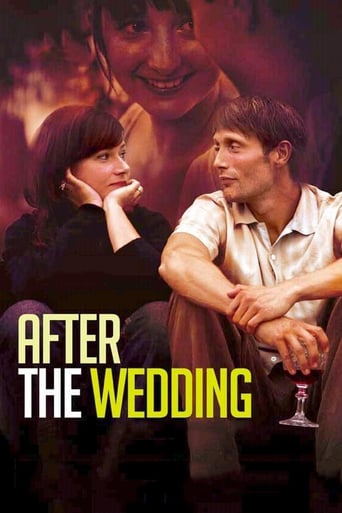Derry Herrera
Not sure how, but this is easily one of the best movies all summer. Multiple levels of funny, never takes itself seriously, super colorful, and creative.
SnoopyStyle
Jacob Pederson (Mads Mikkelsen) does charity work in a Bombay orphanage. They receive an offer for funding from rich Jörgen Lennart Hansson but he requests to meet Jacob. Jacob reluctantly returns to Denmark. Jörgen's daughter Anna is getting married. He is shocked to see Jörgen's wife Helene who happens to be his love some twenty years ago. Is Anna Jacob's daughter? He was a drunk and cheated on Helene back in the day.The look is naturalistic and the acting is rich. Mads is in top form. The premise sets up for a whirlwind of melodrama. Instead, it's a bit more sensitive. I actually could do with a tighter, faster, and wilder melodrama but this will work too. The acting is superb all around. The twists are great.
Rebecca Lynn
After the Wedding: An Unexpectedly Touching Familial Drama "Every acquaintance, every friend, every person who has a place in your heart, it is the time with them that really means something. Nothing else matters". These words, spoken by the masterfully played Jørgen (Rolf Lassgård), sum up the main message of the Danish, Oscar nominated film, After the Wedding. In the hands of a director less skilled than Susanne Bier, After the Wedding may come across as an overblown, soap opera-like melodrama. Instead, Bier uses these cutting emotional moments to develop her characters and their motivations. After the Wedding explores the relationships between wealth and poverty, what it means to be a family, and the individual's role in a larger picture.The film opens with a stoic as ever Mads Mikkelson playing Jacob, the closed off but compassionate manager of an Indian orphanage. Jacob must face the grim reality that without proper funding, his beloved orphanage will close, and the only way to secure the money is for Jacob to travel back to Denmark to confer with a potential benefactor, Jørgen Lennart Hannson. Jørgen promises to consider funding the project–but only if Jacob agrees to attend his daughter's wedding the next day. Why did Jacob leave Denmark 20 years ago? Why is Jørgen orchestrating this event? "Too much fits together too well," comments Jørgen's wife (and as we soon find out, Jacob's ex-lover). The audience is inclined to agree. But what follows is a touching exploration of familial ties.The initial scenes of Copenhagen provide a stark juxtaposition between Denmark's wealth and the abject poverty of Mumbai (all of the orphans could live comfortably in Jacob's hotel room). The audience instinctively sides with Jacob and his feelings of disgust with his own country. The bright colors of the city contrast with the poverty in which most of the residents live. But despite their lack of wealth, the community cares deeply for its members. Jacob has settled into a niche here, formed a cobbled together family with the young orphan Pramod, who he has raised since birth.Initially, Jacob is loath to leave the warm family he has created, believing his home country to be full of disinterested and disingenuous people ("Is it because the houses are far apart that the people are far apart?" Pramod asks Jacob before he leaves). Things become far more muddled when Jacob discovers that he isn't as alone in Denmark as he thought, and the wedding to which he was invited is that of the daughter he never knew existed. But as Jacob begins to embrace his new family, his personal ties to India began to disintegrate. Perhaps most significant is when Jacob, instead of returning to Mumbai by Pramod's birthday as he promised, spends the time in Copenhagen, getting to know his biological daughter, Anna (a moment when they flip through her old photo album together is especially touching).Jørgen, the man that Jacob instinctively despised, was the driving force that brought him and Anna together. Jørgen is at once dominant, manipulative, and as likable as he is infuriating. As the film progresses and we understand his motives, we began to sympathize more and more with him. Jørgen's character raises the question of how much money can buy. Can a person with money and ideals exist? "I'm buying remission for my sins," Jørgen says of his bargain with Jacob, a bargain that would force Jacob to remain in Denmark to serve as the patriarch of Jørgen's family. Though Jacob initially refuses, he begins to question his decision, especially when Anna finds herself lost and alone after her new husband cheats on her.What is more important to a cause, a man, or his money? At one point, Jacob is even directly asked: "think of how many you could help, won't you sell yourself for that?" Ultimately, he does, and discovers that he is somewhat dispensable. Upon returning to India, Jacob invites Pramod to return with him to Denmark, but Pramod refuses. Things are looking up for the orphanage, and remaining in the now well functioning institution with all of his friends means more to him than beginning a new life with Jacob somewhere else.My one complaint is that India seems to play more of a vibrant and exotic backdrop in the film more than anything more substantial. As soon as Jacob arrives in Denmark, it fades into the distance, save for the occasional glimpse of a sad eyed child on the video Jacob brought with him. A place that a person spent 20 years of their life building wouldn't disappear so easily. If the film had a few more scenes exploring the complexity of Jacob's cognitive dissonance and his ties to India, it would pack an even larger emotional punch.
mithil293
A man having a turbulent past of drugs, alcohol and adultery is suddenly bequeathed with realities he cant afford to swallow. Suddenly there are different set of people around him he feels responsible for and to afford these obligations he needs to break away from people that kept him sane all through his solitude. Behind this there is decision to take, promises to be be crushed and hearts to be melted. Following a story of Jacob, who has to travel to his native Denmark to grant funds for his orphanage in India, he is unaware of disturbing coincidences and hidden secrets he would be compelled to stand against. Jacob played by Mads Mikkelsen is at his dramatical best playing the sober guy who thinks he has moved on from his past transgression. His congruous portrayal is deeply underlined with afflicting past which he quite blissfully conveys with those emoting eyes. I will be seeing more of himI have seen only one other Susanne Bier movie and can safely identify the type of cinema related with her. She often construct the story of ordinary humans with plausible but stimulating situations with even more thickening emotions. The aspects where she lingers on the close shots or the sporadically encouraged eyebeaming. The movie does have some overly melodramatic scenes portraying the confliction but efficiently and brilliant in some other more subtle scenes. There is the also the story of Jorgen played brilliantly by Rolf Lassgård who is up for a race against time, he may seem a antagonist at the first but his complex characterisation and agonisingly superb acting renders us a portrayal that in few scenes overpowers the main character. The wife Helene and daughter Anna played by Sidse Babett Knudsen and Stine Fischer Christensen respectivley does put in lot more efforts in contributing to the story.The movie is quite bravely handled and is very much a good watch if you are hungry for some foreign cinema(forgive me). mindbugged.wordpress.com

